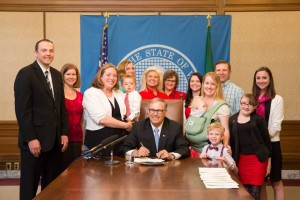 OLYMPIA – Children born in Spokane all receive screenings for medical issues right after birth, but not all results were processed on time. In fact, up to 28 percent arrived to labs later than required, leading to delayed treatment for illness or disease, leaving parents in the dark and wasting time when they could be pursuing treatment for their child. State Rep. Marcus Riccelli (D-Spokane) was one of those parents when he received results from a screening a month after his daughter was born, showing an abnormality in her bloodwork.
OLYMPIA – Children born in Spokane all receive screenings for medical issues right after birth, but not all results were processed on time. In fact, up to 28 percent arrived to labs later than required, leading to delayed treatment for illness or disease, leaving parents in the dark and wasting time when they could be pursuing treatment for their child. State Rep. Marcus Riccelli (D-Spokane) was one of those parents when he received results from a screening a month after his daughter was born, showing an abnormality in her bloodwork.
“It really made me feel powerless, knowing that these results could have been important to my daughter’s health, but we just didn’t know,” said Rep. Riccelli. “It turned out that my daughter was just fine, but not having critical information about the health of your child is simply unacceptable.”
With this experience fresh in his mind, Riccelli authored legislation to require blood specimens for all newborns within 48 hours of birth for diseases such as phenylketonuria and other heritable or metabolic disorders leading to disability or physical defects and for the Department of Health to receive those tests within 72 hours. According to the Department of Health, the changes to the law indicate an impact on newborn screening timeliness.
For instance, local Spokane hospitals have outperformed the rest of the state in collection and transit times for specimens collected from newborns and have improved from last year. Valley Hospital currently has 98.3 percent of samples collected within 48 hours after birth and Deaconess has 98.8 percent collected within 48 hours. Overall, Washington hospitals have improved their two day hospital specimen collection, with almost 1,300 more babies receiving timely screenings.
Continuing the drive for healthier children, Riccelli passed legislation this year which required newborns to be screened for critical congenital heart defects. The legislation, SHB 1285, required pulse oximetry screening to test the amount of oxygen in a newborn’s blood, which can indicate whether a baby has potential heart defects.
September is Newborn Screening Month and Rep. Riccelli encourages all parents to visit the Department of Health website on newborn screening to learn more about screening results, hospital compliance rate, and other resources.
###
